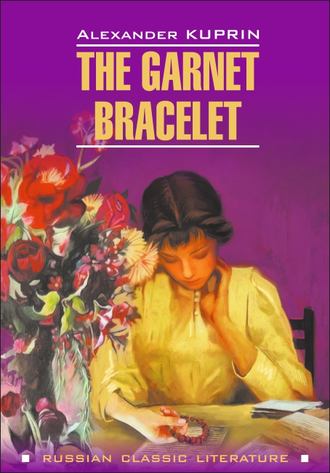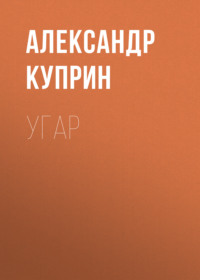
Полная версия
The Garnet Bracelet and other Stories / Гранатовый браслет и другие повести. Книга для чтения на английском языке
Bobrov jumped out of bed and began to run about barefoot.
“Those hospitals and schools of yours don’t mean a thing! They’re no more than sops for humanists like you, concessions to public opinion. I can tell you, if you like, what we actually think of all that. Do you know what a finish is?”
“A finish? Hasn’t that got something to do with horses – with racing?”
“That’s it. A finish is the last seven-hundred foot spurt before the winning-post. The horse makes it at top speed – it’s the supreme effort, and to get the horse to make that effort they lash it till it bleeds. Then, when it’s passed the mark, it may die for all anybody cares. We’re like that, too. When we’ve squeezed the last spurt out of the horse and it drops with a broken back and shattered legs, to hell with it, it’s no longer good for anything! Your schools and hospitals mean a fat lot to a horse that’s breathed its last after the finish. Have you ever watched smelting or rolling? If you have, you ought to know that it takes deucedly strong nerves, steel muscles, and the agility of a circus performer. You ought to know that everyone on the job escapes death several times a day thanks only to his wonderful self-control. And would you like to know how much a workman gets for work of that sort?”
“Still, as long as the mill’s there, the workman’s sure of a job,” Goldberg persisted.
“Don’t be naive, doctor!” cried Bobrov, sitting on the window-sill. “The workman depends today more than ever on market demand, on stock-jobbing, on various intrigues. Each big enterprise passes through different hands three or four times before it gets under way. Do you know how our company came into being? A sum of money was put up by a small group of business men. At first the business was planned on a small scale. But a whole gang of engineers, directors and contractors frittered away the capital before the owners could see what was what. Enormous buildings were erected that turned out to be good for nothing. They were scrapped – blown up with dynamite. Only when the concern was sold at ten kopeks to the ruble did it transpire that the whole dirty gang had been acting by arrangement, for which they were paid by a more powerful and astute company. Now the business is being conducted on a much larger scale, but I know very well that the first failure cost eight hundred workmen their two months’ wages. That’s your safe employment for you! Why, as soon as the shares drop wages slide down too. I suppose you know how shares rise or drop? To bring that about you have to go to Petersburg and whisper in a broker’s ear that you want to sell, say, three hundred thousand rubles’ worth of shares, adding that it’s strictly between you and him and that you’ll pay him a nice brokerage if only he keeps his mouth shut. Then you whisper the same to another couple of brokers, and the shares instantly drop by several dozen rubles. And the greater the secrecy the sooner and surer the drop. Safe employment, indeed!”
With a vigorous push Bobrov flung the window open. Cold air rushed into the room.
“Look, doctor!” cried Bobrov, pointing to the mill.
Goldberg raised himself on his elbow and peered into the night darkness outside. The immense expanse spreading out in the distance was alight with innumerable heaps of red-hot lime-stone, whose surface flared up into bluish and green sulphur flames every now and again. Those were limekilns[2] burning. A blood-red glow wavered over the mill, showing in dark relief the slender tops of the great chimneys, whose lower parts were blurred by grey mist rising from the ground. Ceaselessly those giants belched clouds of dense smoke that merged into a chaotic mass trailing eastwards, with patches like balls of dirty grey or rust-coloured cotton wool. Bright shafts of burning gas trembled and danced above the tall, thin smoke deflectors, making them look like giant torches. The gas flames threw on the smoke cloud above the mill strange, ominous reflections. From time to time, following the sharp clank of the signal hammer, the bell of a blast-furnace would go down, and a whirlwind of flames and soot would hurtle skywards from the orifice of the furnace, roaring like distant thunder. Then, with startling suddenness, the whole mill would flash into view for a few seconds, and the serried row of black round hot-blast stoves would look like the towers of a fabulous iron castle. The burning coke ovens stretched in long, regular rows. Occasionally one of them flared up and blazed like a huge red eye. Electric light added its bluish, lifeless shine to the glare of red-hot iron. There was a continuous clangour and crashing of iron.
In the glow of the mill lights Bobrov’s face had taken on a sinister coppery hue, his eyes glistened bright red, and tousled hair hung over his forehead. His voice was piercing and angry.
“There he is – that Moloch who wants warm human blood!” he cried, stretching his thin arm out of the window. “To be sure, this is progress and machine labour and cultural advancement. But, for heaven’s sake, think of it – twenty years! Twenty years of human life a day! At moments I feel like a murderer, I swear!”
“Good God, the man’s mad,” thought the doctor, shuddering. He set about soothing Bobrov.
“Come, come, Andrei Ilyich, my friend. Why worry about foolish things! It’s damp outside, and you’ve opened the window. Go to bed, and take some bromide – here.”
“He’s a maniac, he really is,” he thought, with a feeling of both compassion and fear.
Exhausted by his outburst, Bobrov put up little resistance. But when he got into bed he suddenly broke into hysterical sobs. And the doctor sat by his side for a long time, stroking his head as if he had been a child, and soothing him with what words of sympathy occurred to him.
VI
Next day Vasily Terentyevich Kvashnin was welcomed in grand style at the Ivankovo station. The entire mill management was gathered there by eleven o’clock. Everyone seemed ill at ease. The manager, Sergei Valerianovich Shelkovnikov, drank glass after glass of seltzer and pulled out his watch every moment, only to put it back in his pocket mechanically without glancing at the dial – an absent-minded gesture that betrayed his uneasiness. His face – the handsome, well-groomed, self-confident face of a man of society – remained unchanged. Only a few men knew that as manager of the construction project he was a mere figure-head. The real manager was Andreas, a Belgian engineer of mixed Polish and Swedish ancestry, whose role at the mill none of the uninitiated could make out. The offices of the two managers had a connecting door and Shelkovnikov dared not take decision on any important paper without consulting the pencil tick which Andreas would put somewhere in a corner of the sheet. In urgent cases, when consultation was not possible, he would look worried and say to the solicitor in a casual tone, “I’m sorry, but I positively can’t spare a moment for you – I’m terribly busy. Kindly state your business to Mr. Andreas, and he will refer it to me later by special note.”
The services rendered to the Board by Andreas were innumerable. He had conceived the brilliantly fraudulent plan to ruin the original company, and he, too, had carried the intrigue to the end with a firm but invisible hand. His designs were distinguished by astounding simplicity and coherence, and were considered the last word in mining. He spoke many European languages and, in addition to his special subject, was well informed in a great variety of other subjects – a rare phenomenon among engineers.
Among those gathered at the station, Andreas, a man with a consumptive figure and the face of an old ape, was the only one who retained his habitual stolidity. He had arrived last and was slowly pacing the platform, his hands elbow-deep in the pockets of his wide, baggy trousers as he chewed his eternal cigar. His light grey eyes, which bespoke the powerful mind of a scientist and the strong will of an adventurer, stared indifferently as always from under the tired, swollen eyelids.
No one was surprised at the arrival of the Zinenko family. Somehow everybody had long been used to looking upon them as part and parcel of life at the mill. Into the cold and gloomy station hall, the young ladies brought their forced animation and unnatural laughter. They were surrounded by the younger engineers, who were tired of waiting. The young ladies at once took up their customary defensive position and began to lavish right and left their charming but stale naivetes. Anna Afanasyevna, little and flustered, looked like a restless brood-hen among her fussing daughters.
Bobrov, tired and almost ill after his fit of the previous night, sat all alone in a corner of the hall, smoking a great deal. When the Zinenko family came in and sat down chirping loudly at a round table, he had two very vague feelings. On the one hand, he was ashamed – a heart-searing shame for another – of the tactlessness which he felt the family had shown by coming. On the other hand, he was glad to see Nina, ruddy with the swift drive, her eyes shining with excitement; she was very prettily dressed and, as always happens, looked much more beautiful than his imagination had painted her. His sick, harassed soul suddenly flamed up with irrepressible desire for a tender, fragrant love, with longing for a woman’s habitual, soothing caress.
He sought for a chance to approach Nina, but she was busy chatting with two mining students, who were vying with each other to make her laugh. And she did laugh, more cheerful and coquettish than ever, her small white teeth gleaming. Nevertheless, twice or three times her gaze met Bobrov’s, and he fancied that her eyebrows were slightly raised in a silent, but not hostile query.
The bell rang on the platform, announcing that the train had left the previous station. There was a commotion among the engineers. Smiling sarcastically, Bobrov from his corner watched twenty-odd men gripped by the same cowardly thought; their faces suddenly became grave and worried, their hands ran for the last time over the buttons of their frock-coats, their neckties and caps, and their eyes turned towards the bell. Soon no one was left in the hall.
Bobrov went out on to the platform. The young ladies, abandoned by the men who had been entertaining them, crowded helplessly round Anna Afanasyevna, near the door. Nina turned to face Bobrov, who had been gazing at her fixedly, and walked over to him, as if guessing that he wanted to talk to her in private.
“Good morning. Why are you so pale today? You don’t feel well?” she asked, holding his hand in a firm, tender grasp and looking him in the eyes, earnestly and caressingly. “Why did you leave so early last night, without even saying goodbye? Were, you angry?”
“Yes and no,” replied Bobrov, with a smile. “No, because I have no right to be angry, have I?”
“I think anybody has a right to be angry. Especially if he knows that his opinion is valued highly. Why ‘yes’?”
“Because – You see, Nina Grigoryevna,” said Bobrov, feeling a surge of boldness, “last night when you and I were sitting on the veranda – remember? – I had a few wonderful moments, thanks to you. And I realized that if you’d wanted to, you could have made me the happiest man on earth – But why should I be afraid or hesitate? You know, don’t you – you must have guessed, you must have known for a long time that I – ”
He could not finish. The boldness that had surged over him was suddenly gone.
“That you what? What were you going to say?” asked Nina, with feigned indifference, but in a voice which quivered in spite of her, and casting down her eyes.
She expected a confession of love, which always thrills the hearts of young girls so strongly and so sweetly, no matter whether they share the sentiment or not. Her cheeks had paled slightly.
“Not now – some other time,” Bobrov stammered. “I’ll tell you some other day. But not now, for goodness’ sake,” he added entreatingly.
“All right. But still, why were you angry?”
“Because, after those few moments, I walked into the dining-room in a most – how shall I put it? – in a most tender mood, and when I walked in – ”
“You were shocked by the talk about Kvashnin’s income, is that it?” Nina prompted, with that instinctive perspicacity which sometimes comes to the most narrow-minded women. “Am I right?” She faced him squarely, and once more enveloped him in a deep, caressing gaze. “Be frank. You mustn’t keep anything from your friend.’”
Some three or four months before, while boating with a crowd of others, Nina, excited and softened by the beauty of the warm summer night, had offered Bobrov her friendship to the end of time. He had accepted the offer’ very earnestly, and for a whole week had called her his’ friend, just as she had called him hers. And whenever; she had said my friend, slowly and significantly, with her usual languorous air, the two short words had gone straight to his heart. Now he recalled the joke, and replied with a sigh:
“Good, ‘my friend,’ I’ll tell you the whole truth though it won’t be easy. You always inspire me with a painfully divided feeling. As we talk there are moments when, by just one word, one gesture, or even one look, you suddenly make me so happy! Ah, but how can I put such a sensation into words? Have you ever noticed it?”
“Yes,” she replied almost in a whisper, and lowered her eyes, with a sly flutter of lashes.
“And then, all of a sudden, you would become a provincial young lady, with a standard vocabulary of stock phrases and an affected manner. Please don’t be cross with me for my frankness. I wouldn’t have spoken if it hadn’t tormented me so terribly.” “I’ve noticed that, too.”
“Well, there you are. I’ve always been sure that you have a responsive and tender heart. But why don’t you want to be always as you are at this moment?”
She turned to face him again, and even moved her hand, as if to touch his. They were walking up and down the vacant end of the platform.
“You never tried to understand me, Andrei Ilyich,” she said reproachfully. “You’re nervous and impatient. You exaggerate all that is good in me, but then you won’t forgive me for being what I am, though, in the environment in which I live, I can’t really be anything else. It would be ridiculous if I were – it would bring discord into our family. I’m too weak and, to tell the truth, too insignificant to fight and be independent. I go where everybody else does, and I look on things and judge them as everybody else does. And don’t imagine I don’t know I’m common. But when I’m with the others I don’t feel it as I do with you. In your presence I lose all sense of proportion because – ” She faltered. “Oh, well – because you’re quite different, because I’ve never met anyone like you in my life.”
She thought she was speaking sincerely. The invigorating freshness of the autumn air, the bustle at the station, the consciousness of her own beauty, and the pleasure she felt sensing Bobrov’s loving gaze fixed upon her, electrified her, like all hysterical characters, into lying with inspiration and charm, and quite unwittingly. Admiring herself in her new role of a young lady craving for moral support, she wanted to say agreeable things to Bobrov.
“I know you look on me as a flirt. Please don’t deny it – I admit I give you cause to think that. For example, I often chat with Miller and laugh at his jokes. But if you only knew how I detest that oily cherub! Or take those two students. A handsome man is disagreeable because he’s always admiring himself, if for no other reason. Believe me, although it may sound strange, plain men have always appealed to me particularly.”
As she uttered this charming sentence in her most tender accents, Bobrov drew a mournful sigh. Alas! he had heard this cruel consolation from women more than once, a consolation they never refuse to their ugly admirers.
“So I may hope to appeal to you some day?” he asked in a joking tone which, however, clearly suggested bitter self-mockery.
Nina hastened to make up for her blunder. “See what a man you are. I positively can’t talk with you. Must you fish for compliments, sir? Shame on you!”
She was a little embarrassed by her own gaucherie, and to change the subject she asked in a playfully imperious voice, “Well, now, what was it you were going to tell me in different circumstances? Kindly answer me at once!”
“I don’t know – I don’t remember,” Bobrov stammered, his ardour damped.
“Then I’ll remind you, my secretive friend. You began by speaking of last night. You said something about wonderful moments, and then you said that I must have noticed long ago – but noticed what? You didn’t finish. So kindly say it now. I demand it, do you hear?”
She was looking at him with a smile shining in her eyes – a smile at once sly and promising and tender. For one sweet moment his heart stood still in his chest, and he felt a fresh surge of his former courage. “She knows, she wants me to speak,” he thought, bracing himself.
They halted on the very edge of the platform, where they were quite alone. Both were excited. Nina was awaiting his reply, enjoying the piquancy of the game she had started, while Bobrov was casting about for words, breathing heavily with agitation. But just then, following the shrill sound of signal horns, a hubbub broke out on the platform.
“I’m waiting, do you hear?” Nina whispered, walking away from Bobrov. “It’s more important for me than you think.”
An express train, wrapped in black smoke, leapt into view from beyond a curve. A few minutes later, clattering over the points, it slowed down smoothly, and pulled up at the platform. At its tail end was a long service carriage shining with fresh blue paint, and the crowd rushed towards it.
The conductors hurried respectfully to open the carriage door; a ladder was unfolded instantly. Red with running and excitement, a frightened look on his face, the station master was urging the workmen uncoupling the service carriage. Kvashnin was one of the principal shareholders of the X Railway and travelled on its branch-lines with greater pomp than was sometimes accorded even to the highest railway officials.
Only four men entered the carriage: Shelkovnikov, Andreas, and two influential Belgian engineers. Kvashnin was sitting in an easy chair, his enormous legs thrown apart and his belly thrust forward. He wore a round felt hat, his fiery hair shining under it; his face, shaved like an actor’s, with flabby jowls and a triple chin, and mottled with big freckles, seemed drowsy and annoyed; his lips were curled in a contemptuous, sour grimace.
With an effort he rose to greet the engineers.
“Good morning, gentlemen,” he said in a husky, deep voice, holding out his huge chubby hand for them to touch respectfully by turns. “How’s everything at the mill?”
Shelkovnikov began to report in the stiff language of an official account. Everything was all right at the mill, he said. They had been waiting for Vasily Terentyevich’s arrival to blow in the blast-furnace and lay the foundations of new buildings. The workmen and foremen had been hired at suitable rates. The great flow of orders induced the management to start the construction as early as possible.
Kvashnin listened, his face turned away to the window, viewing absent-mindedly the crowd which pressed round the carriage. His face expressed nothing but disgusted weariness.
Suddenly he interrupted the manager to ask, “Look here – who’s that girl?”
Shelkovnikov glanced out of the window.
“There, that one with the yellow feather in her hat.” Kvashnin pointed impatiently.
“Oh, that one?” With an eager look the manager bent to Kvashnin’s ear and whispered mysteriously in French, “She’s the daughter of our warehouse manager. His name is Zinenko.”
Kvashnin nodded heavily. Shelkovnikov resumed his report, but his chief interrupted him again.
“Zinenko?” he drawled thoughtfully, staring out of the window. “Which Zinenko is that? Where have I heard the name?”
“He’s in charge of our warehouse,” Shelkovnikov said again respectfully, with deliberate indifference.
“Oh, yes, now I remember,” said Kvashnin. “They told me about him in Petersburg. All right, go on, please.”
Nina realized by her infallible feminine intuition that just then Kvashnin was looking at her and speaking about her. She turned slightly away, but still Kvashnin could see her face, rosy with coquettish pleasure and showing all its pretty moles.
At last the report was finished, and Kvashnin passed into the roomy glass compartment built at the end of the carriage.
It was a moment which Bobrov thought would have been well worth perpetuating with a good camera. Kvashnin lingered for some reason behind the glass wall, his bulky figure towering above the group that clustered round the carriage entrance, his feet planted wide apart and his face wearing a sullen look, the whole giving the impression of a crudely wrought Japanese idol. The great man’s immobility apparently dismayed those who had come to meet him: the prepared smiles froze on their lips as they stared up at Kvashnin with a servility that bordered on fear. The dashing conductors had stiffened into soldierly postures on either side of the door. Glancing by chance at Nina, Bobrov with a pang noticed on her face the same smile as he saw on the other faces, and the same fear of a savage looking at his idol.
“Is this really nothing but a disinterested, respectful amazement at a yearly income of three hundred thousand rubles?” he thought. “If so, what makes all these people wag their tails so cringingly before a man who never so much as looks at them? Perhaps what’s at work here is some inconceivable psychological law of servility?”
Having stood above for a while, Kvashnin decided to start, and descended the steps, preceded by his belly and carefully supported by the train crew.
In response to the respectful bows of the crowd, which parted quickly to let him pass, he nodded carelessly, thrusting out his thick lower lip, and said in a nasal voice, “Gentlemen, you’re dismissed till tomorrow.”
Before reaching the exit he beckoned to the manager.
“You’ll introduce him to me, Sergei Valerianovich,” he said in an undertone.
“You mean Zinenko?” asked Shelkovnikov obligingly.
“Who else, damn it!” growled Kvashnin, suddenly irritated. “No, not here!” He held the manager by the sleeve as he was about to rush off. “You’ll do it at the mill.”
VII
The laying of the foundations and the blowing in of the new blast-furnace were to start four days after Kvashnin’s arrival. It was planned to celebrate the two events with the utmost pomp, and printed invitations had been sent to the iron and steel mills in the neighbouring towns of Krutogori, Voronino, and Lvovo.
Two more members of the Board of Directors, four Belgian engineers, and several big shareholders arrived from Petersburg after Kvashnin. It was rumoured among the mill personnel that the Board had allocated about two thousand rubles for the celebration dinner, but so far nothing had happened to bear out these rumours, and the contractors had to shoulder the whole burden of buying wines and food.
Luckily the day of the celebration was fine – one of those bright, limpid days of early autumn when the sky seems so intensely blue and deep and the cool air is like exquisite, strong wine. The square pits, dug out for the foundations of the new blower and bessemer, were surrounded by a dense crowd of workers forming a U. In the middle of this living wall, on the edge of the pit, stood plain, unpainted table covered with a white cloth, on which a cross and a gospel-book lay beside a sprinkler and a tin bowl for holy water. The priest, attired in a green chasuble embroidered with golden crosses, was standing a little way off, at the head of fifteen workmen who had volunteered to serve as choristers. The open side of the U was taken up by engineers, contractors, senior foremen, clerks – a motley, bustling crowd of two hundred-odd people. A photographer was busy on the embankment, with a black cloth thrown over his head and the camera.
Ten minutes later Kvashnin arrived at the site in a troika of magnificent greys. He was all alone in the carriage, for no one else could possibly have squeezed in beside him. He was followed by five or six more vehicles. Instinctively the workmen at once recognized him as “the boss” and took off their caps as one man. Kvashnin stalked past them and nodded to the priest.












